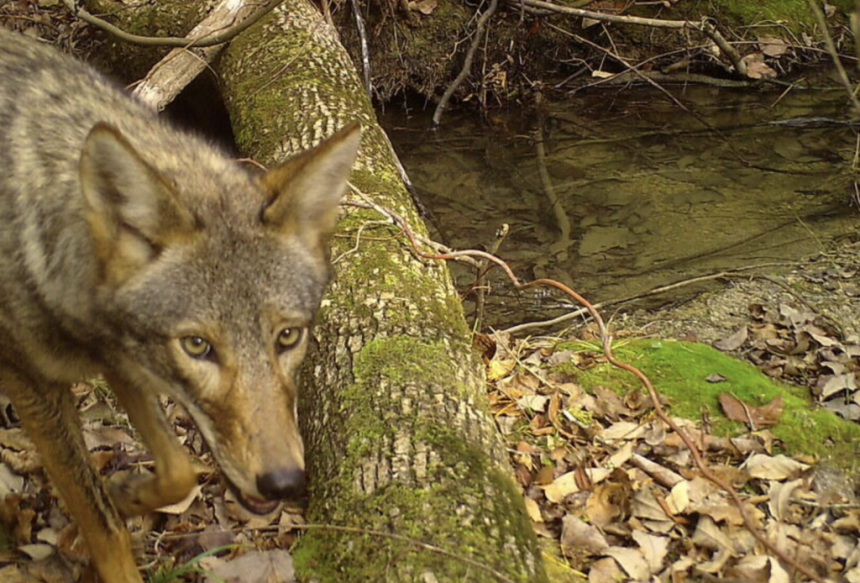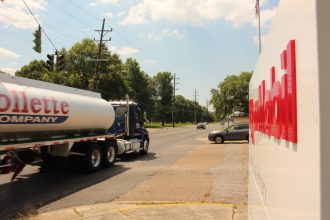It could soon be illegal to rehabilitate coyotes in Louisiana. (Photo from USGS)
Coyotes have been a source of controversy in Louisiana, especially where they interact with people and pets in suburban areas. But they do have their supporters, including those with the training and credentials to help heal wounded animals.
These advocates were dealt a setback Thursday when the Louisiana Wildlife and Fisheries Commission voted to approve a notice of intent to ban the practice of rehabilitating what are designated as outlaw quadrupeds in Louisiana. That label applies to three species – feral hogs, armadillos and coyotes.
It’s already illegal in Louisiana to release a captured coyote into the wild. The change the commission approved Thursday prohibits licensed wildlife rehabilitators from caring for injured coyotes. The pending policy update now enters a 30-day public comment period before the commission reviews it again. It then heads to a legislative oversight committee and then LDWF Secretary Tyler Bosworth for final approval.
Advocates for coyotes say the number that are rescued and rehabbed in Louisiana is insignificant, making the policy change unnecessary.
Tisha Raiford, a state-licensed wildlife rehabilitator and founder of Geaux Wild, a nonprofit wildlife care center in Hammond, said she has only given aid to three coyotes.
Only six coyote rehabilitations were reported to the Louisiana Department of Wildlife and Fisheries in 2024, said Bradley Breland, the state’s wildlife permit coordinator.
Paul Leberg, an ecologist and biology professor at the University of Louisiana at Lafayette, said that small number of rehabilitations wouldn’t have “any impact on coyote populations or on the way Louisiana’s ecosystems function.”
Coyotes have spread throughout the southern and eastern United States only over the past hundred years, making them a relatively new species to Louisiana when positioned within the thousands of years that make up evolutionary history. They came after the disappearance of wolves left an open niche for a predator species to fill in the ecosystem.
“They’ve certainly gotten here on their own, but they’re becoming quite common,” Leberg said
State wildlife officials do not have an official count for Louisiana’s coyote population, though estimates based on research observation place the number between 50,000 and 100,000.
As human-driven development and coyote habitat have overlapped, it’s created conflict – especially where families fear for the safety of their children and pets. It’s a situation Wildlife and Fisheries is trying to curb.
Farmers and landowners voiced their support at Thursday’s commission meeting for the change, citing the impact coyotes have on livestock.
“While we understand some people’s feelings, we also understand our farmers and ranchers having to protect their investments,” said Avery Davidson, spokesman for the Louisiana Farm Bureau Federation.
“It’s a really difficult position, but it’s one we have to take,” he said.
Amy Shutt, executive director of the Canid Project, said more public education is needed to illustrate how few coyotes are rehabilitated. Her nonprofit group supports educational outreach on foxes and coyotes.
She argued that, given the non-invasive nature of coyotes and that so few are rescued, rehabilitation shouldn’t be banned for the species.
“I don’t understand the logic behind it, you know, that we can’t help an animal in need,” Shutt said.
Leberg, the ULL biologist, said he doesn’t consider coyotes a nuisance because of the lack of harm and beneficial function they serve in the ecosystem, helping control deer and small mammal populations and spreading seeds through their scat.
Joey Hinton, a senior research scientist at the Wolf Conservation Center in South Salem, New York, said that while human interactions with coyotes tend to get a lot of attention, they are relatively rare.
Advocates and rehabilitators say this minimal impact justifies showing compassion to an individual, injured animals.
In an interview after the commission meeting, Raiford described getting a call last year about a coyote found covered in mosquitoes, unable to move. She nicknamed it Zelda, brought it to her care center and nursed it back to good health.
Raiford kept her social media followers updated on Zelda’s rehabilitation, garnering news media coverage and attention from the children’s educational YouTube channel, Earth Rangers. This exposure increased empathy and understanding between humans and wildlife, as well as promoting responsible environmental stewardship, she said.
“I feel every life matters,” Raiford said. “Whether it is a bunny, a possum, a squirrel, a coyote, a bobcat, if that animal is in need, I feel that animal deserves to have a chance.”









